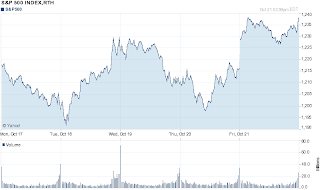Long-time readers will notice that this is the first time I have commented on the electric car company Tesla Motors (NASDAQ: TSLA). Its CEO and Product Architect is Elon Musk, a Co-Founder of PayPal. Of course, PayPal was sold to Ebay for US$1.5 billion, allowing Elon Musk to start Tesla Motors and SpaceX.
For a time, Tesla was an extremely niche player. By selling only the US$100,000 Roadster (and in limited quantities each year) there was little earnings growth potential. However, that is all about to change in 2012. Tesla's lower-cost Model S is scheduled to begin deliveries in mid-2012. The base price is a much more affordable US$49,900 (after US Federal tax credits). Interestingly, this price point was first announced by Tesla in 2009. For investors who have never heard of Tesla before, the ability of the company to stick to a promise it made 3 years ago shows credibility.
The Model S' battery allows you to drive 300 miles on a single charge. That is 7.5 times longer than the Chevrolet Volt's 40-mile range. The Model S goes from 0-96 kph in 5.6 seconds.
It is because of the huge expected increase in volume (as a result of the Model S) that TSLA was able to trade very close to its 52-week high, by staying at about $34 in late November and early December, when world markets were hammered by the euro zone debt crisis and the weak U.S. economy.
TSLA has two major advantages over the traditional automakers:
1) Marketing by Elon Musk
As a colleague of mine who is a car enthusiast pointed out, marketing is everything in the auto industry. For example, BMW has grabbed significant mindshare with its ConnectedDrive commercials on TV and Youtube. In fact, the next vehicle I purchase will most likely be a BMW (either 1 series or 3 series) unless I go for the Chevrolet Volt or even the Tesla Model S.
With Elon Musk, widely referred to as the "Iron Man" of our time, as Tesla's CEO and Product Architect, he has the ability to out-market nearly every other automaker. It's not simply creative commercials. Appearing on various magazine covers, as he has done in the past, would certainly help sales.
2) Dominating Electric Vehicles
As my car-enthusiast colleague pointed out, the auto industry is characterized by Toyota's obsession to ensure that the Camry remains the leader in its category, while Honda is similarly obsessed over Civic staying ahead of the Corolla and the Elantra. Thus, these traditional automakers simply don't have the focus needed to make a strong push in electric cars.
The only exception is Nissan-Renault. In fact, some believe it's the only real competitor to Tesla (ignoring GM and its Volt). The Nissan Leaf has gained quite a bit of mindshare, thanks to its marketing. Thus, Nissan-Renault will likely be able to be very competitive against Tesla. However, it is nearly impossible to see how Nissan could have better marketing than what Tesla's ultra-famous and super-popular Elon Musk can muster.
Partnership With Toyota
Tesla Motors is benefiting from a partnership with Toyota. This partnership actually validates my suggestion above that most of the traditional automakers are too focused on their traditional models to make much of an impact in electric vehicles. While some might consider Toyota a pioneer in hybrid vehicles with the Prius, it had to partner with Tesla to get its electric packs for future Toyota electric cars. Partnering with the automaker that was recently number 1 in the world in volume allows Tesla to earn additional revenue.
Looking Ahead to mid-2012
Tesla is expected to post losses for 2011 (adjusted EPS of -US$2.175) and 2012 (adjusted EPS of -US$1.900). But the number to watch for is sales. It's expected to increase from $203.5 million in 2011 to $550.333 million in 2012, an increase of 170.43%. This number alone is likely the reason why the stock has held up relatively well amid the horrendous stock market this year. As Tesla offers additional models (another one is expected in 2014) revenue will only increase further.
I will be test driving the Roadster within the next three weeks, and will be posting an article after. If any of my readers follow Tesla, please leave a comment to let me know what you think about their products.























